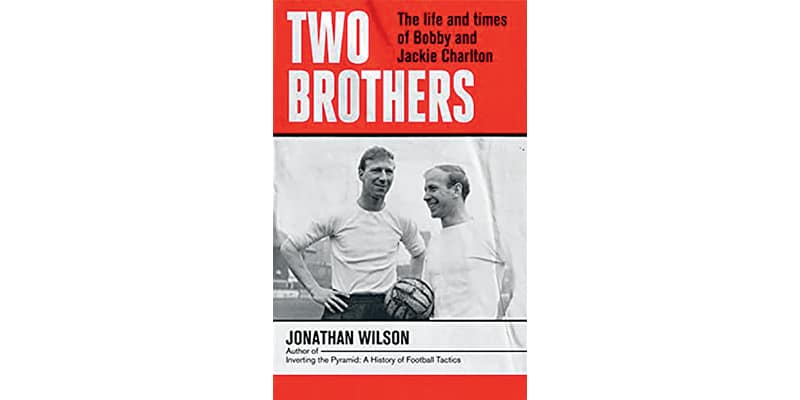
Little, Brown, £20
Reviewed by Joyce Woolridge
From WSC 425, October 2022
Buy the book
The death of Jack Charlton in 2020 was probably the motivation for this new biography of the two brothers, 20 years after the publication of Leo McKinstry’s definitive Jack and Bobby, which, inevitably, Jonathan Wilson draws heavily upon. McKinstry was relatively even-handed in his judgements but Wilson seems to feel that there is a balance to be redressed in Jack’s favour. His book opens with an eloquent vignette of the eldest Charlton boy’s first day below ground at the pit in Ashington which convinced him absolutely that he should ignore his doubts about becoming a professional footballer and accept Leeds United’s terms to escape the horrors of slaving underground.
If as a footballer Jack was continually referred to as the brother of the far more talented Bobby, his career in management, particularly his unlikely stint in charge of the Irish national team, bears no comparison to his sibling’s sole, underwhelming managerial gig at Preston. Bobby rather disappears from the last quarter of the book where Jack, in his inimitable uncompromising style, laced with some great one-liners, takes the world’s hardest drinking international team to unexpected and repeated near glory. Bobby’s work on the Manchester United board is dealt with only in outline. This is not the only time one or both Charltons take a back seat. Aside from his lucid and eminently readable prose, what Wilson brings to all of his books is a fascinating discussion of the prevailing tactical context, here, he argues, born out of the challenge of modernity. Thus midway through it is those brothers from other mothers, Matt Busby, Don Revie and Alf Ramsey, who take centre stage in an extended analysis of how the traditionalist Busby ignored and Revie and Ramsey embraced the new, the latter’s tactics particularly embodying the spirit of 1960s brutalism. Both Bobby, the elegant, restrained thoroughbred, and Jack, the voluble, ungainly, combustible centre-half, were equally integral to the team Ramsey created.
Busby is an obvious irritant to Wilson, who complains that he didn’t have “a systemic philosophy at all. His tactical thought consists of some vague outlines of the attributes needed in each position”, despite which he managed to preside over three very successful teams. Revie, by contrast, was a tactician par excellence whose infamous voluminous dossiers on opponents may have remained largely unread by his players “but… the information was there if they wanted it”.
The least convincing section is where Wilson answers his own question: “Were Leeds dirty?” The attempt to argue that they were partly unfairly tarred with this reputation after an editorial in FA News referred to them as having the worst disciplinary record of any club is never more than half-hearted. Especially when he discusses possibly one of their most effective strategies, Jack blocking off the opposition keeper on short corners. Revie’s tactical preparation did not win Leeds more trophies, according to Wilson, because “they were too good for their era” and needed a larger squad and more rotation – and because Busby was just lucky to have three of the greatest players ever in his forward line.
Overall, there is not much new here to learn about the Charltons. But Two Brothers tells a familiar, yet extraordinary, tale exceptionally well, illuminated and refreshed by Wilson’s particular perspectives and insights.
This article first appeared in WSC 425, October 2022. Subscribers get free access to the complete WSC digital archive
Tags: Alf Ramsey, Bobby Charlton, Don Revie, Jack Charlton, Jonathan Wilson, Leeds United, Manchester United, Matt Busby
